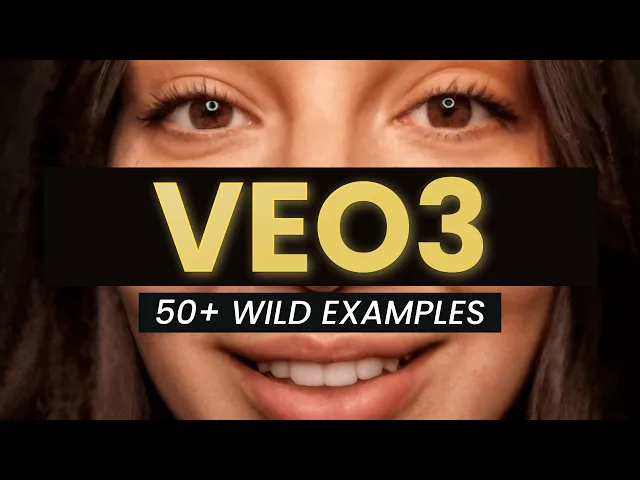50+ INSANE VEO3 Examples You Need to See! (Sorry Hollywood)

AI film revolution signals trouble for Hollywood
In a startling development for the entertainment industry, text-to-video AI has rapidly evolved from a novelty to a formidable creative force. The video I recently viewed showcases VEO3, an AI system generating remarkably cinematic footage with photorealistic quality that would have seemed impossible just months ago. As these tools become more accessible, the implications for traditional filmmaking are both exciting and potentially destabilizing.
Key developments in AI video generation
-
Unprecedented realism: VEO3 can now produce scenes with human figures, complex lighting, and camera movements that previously required professional crews and substantial budgets.
-
Creative flexibility: The system handles diverse prompts across genres—from sci-fi landscapes to period dramas—generating content that follows sophisticated narrative and stylistic direction.
-
Technical evolution: There's been remarkable progress in handling previously problematic elements like human faces, hands, and complex movements, areas where earlier AI systems consistently failed.
-
Accessibility transformation: Tools that would have required millions in development are becoming available to individual creators, potentially democratizing high-quality video production.
-
Ethical gray areas: As these systems improve, they raise significant questions about copyright, actor likeness rights, and displacement of creative professionals.
The economic disruption has already begun
The most striking insight from this technology showcase isn't just the quality of the output, but the economic implications. VEO3 and similar tools are rapidly approaching a threshold where they can replace substantial portions of traditional production pipelines. A process that once required camera operators, lighting technicians, location scouts, and production designers can now potentially be accomplished through text prompts and AI generation.
This matters enormously because the entertainment industry employs hundreds of thousands of skilled professionals whose livelihoods may face disruption. In 2023, we saw writers and actors strike partly over AI concerns—these examples suggest their worries were well-founded. The technology is advancing faster than regulatory frameworks or industry practices can adapt.
Beyond the demonstration: Real-world applications emerging
What the video doesn't fully explore is how these tools are already finding practical applications. Several indie filmmakers are using AI-generated sequences for scenes that would otherwise exceed their budgets. One documentary producer I spoke with recently used similar technology to recreate historical events where no footage exists,
Recent Videos
How To Earn MONEY With Images (No Bullsh*t)
Smart earnings from your image collection In today's digital economy, passive income streams have become increasingly accessible to creators with various skill sets. A recent YouTube video cuts through the hype to explore legitimate ways photographers, designers, and even casual smartphone users can monetize their image collections. The strategies outlined don't rely on unrealistic promises or complicated schemes—instead, they focus on established marketplaces with proven revenue potential for image creators. Key Points Stock photography platforms like Shutterstock, Adobe Stock, and Getty Images remain viable income sources when you understand their specific requirements and optimize your submissions accordingly. Specialized marketplaces focusing...
Oct 3, 2025New SHAPE SHIFTING AI Robot Is Freaking People Out
Liquid robots will change everything In the quiet labs of Carnegie Mellon University, scientists have created something that feels plucked from science fiction—a magnetic slime robot that can transform between liquid and solid states, slipping through tight spaces before reassembling on the other side. This technology, showcased in a recent YouTube video, represents a significant leap beyond traditional robotics into a realm where machines mimic not just animal movements, but their fundamental physical properties. While the internet might be buzzing with dystopian concerns about "shape-shifting terminators," the reality offers far more promising applications that could revolutionize medicine, rescue operations, and...
Oct 3, 2025How To Do Homeless AI Tiktok Trend (Tiktok Homeless AI Tutorial)
AI homeless trend raises ethical concerns In an era where social media trends evolve faster than we can comprehend them, TikTok's "homeless AI" trend has sparked both creative engagement and serious ethical questions. The trend, which involves using AI to transform ordinary photos into images depicting homelessness, has rapidly gained traction across the platform, with creators eagerly jumping on board to showcase their digital transformations. While the technical process is relatively straightforward, the implications of digitally "becoming homeless" for entertainment deserve careful consideration. The video tutorial provides a step-by-step guide on creating these AI-generated images, explaining how users can transform...
